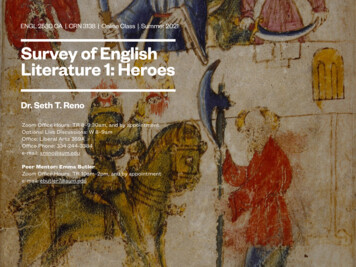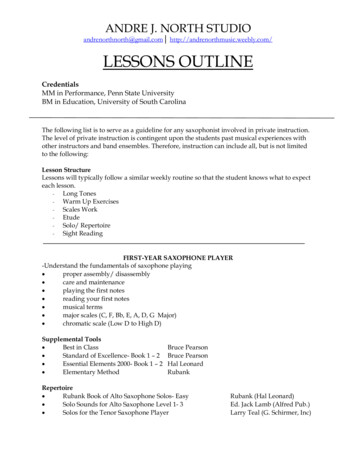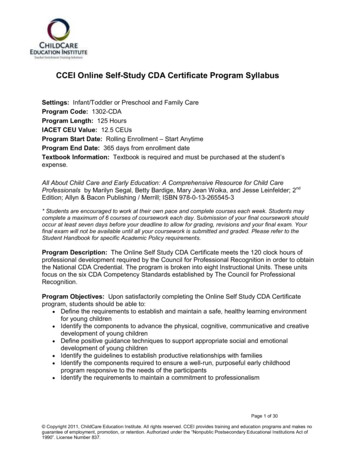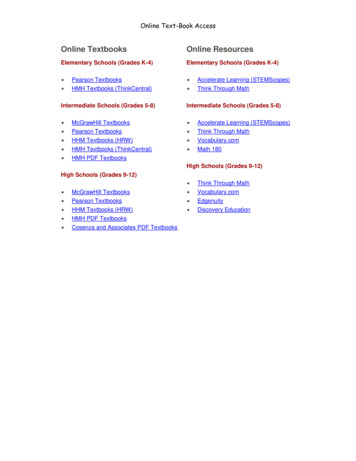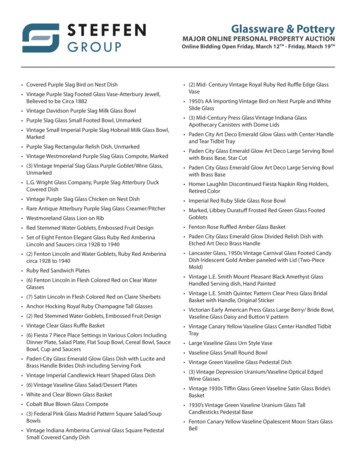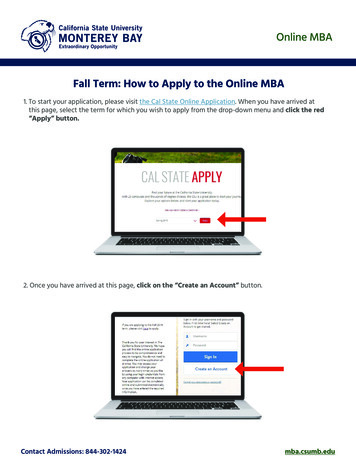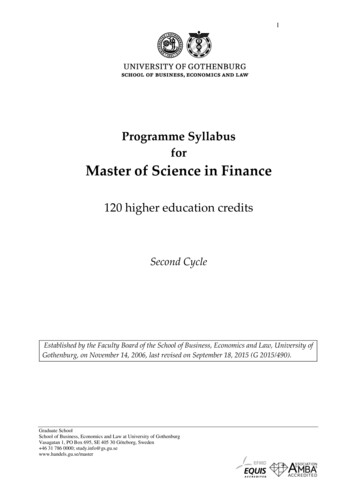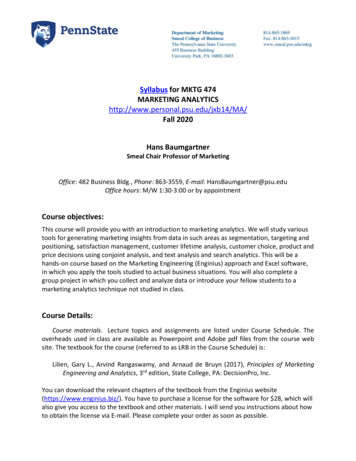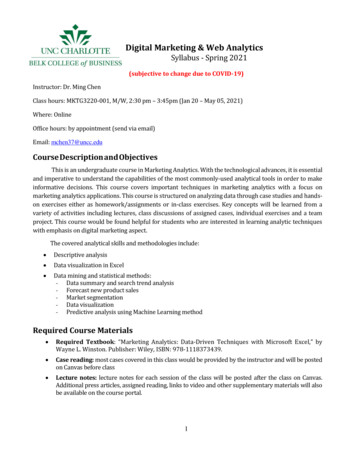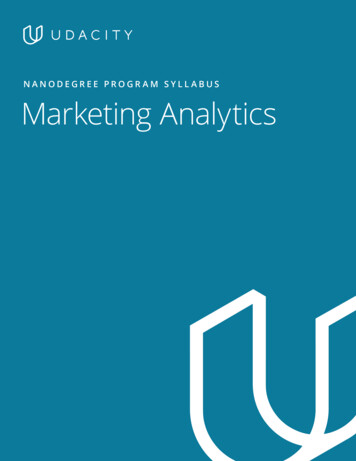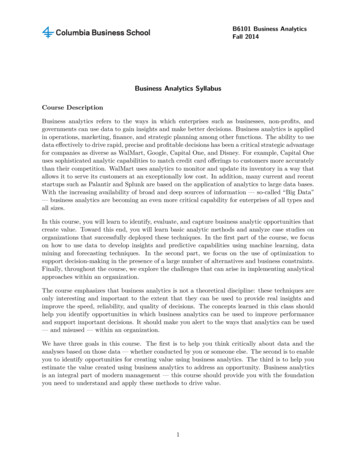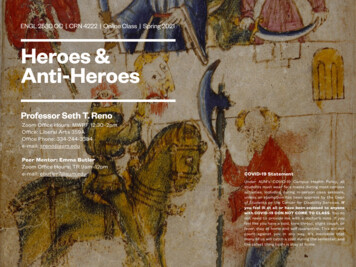
Transcription
ENGL 2530 OC CRN 4222 Online Class Spring 2021Heroes &Anti-HeroesProfessor Seth T. RenoZoom Office Hours: MWRF 12:30–2pmOffice: Liberal Arts 359AOffice Phone: 334-244-3384e-mail: sreno@aum.eduPeer Mentor: Emma ButlerZoom Office Hours: TR 9am–12pme-mail: ebutler7@aum.eduCOVID-19 StatementUnder AUM’s COVID-19 Campus Health Policy, allstudents must wear face masks during most campusactivities, including during in-person class sessions,unless an exemption has been approve by the Deanof Students or the Center for Disability Services. Ifyou feel ill at all or have been exposed to anyonewith COVID-19 DON NOT COME TO CLASS. You donot need to provide me with a doctor’s note. If youfeel like you have a cold, sore throat, slight cough, orfever, stay at home and self quarantine. This will notcount against you in any way. It’s inevitable thatmany of us will catch a cold during the semester, andthe safest thing to do is stay at home.
Course DescriptionWhat makes a hero a hero? Why do we value heroism and celebrateheroes? Have heroes changed across time? What about villains and antiheroes? Do we value them, too? These are central questions we willconsider in this course. We will study famous heroes and anti-heroes inBritish literature from the medieval and Renaissance periods. We will readabout Beowulf’s heroic and bloody battles with the monster Grendel; SirGawain and the indestructible Green Knight; Faustus selling his soul tothe devil; and much more. We’ll also trace how these heroes live on in thetwenty-first century through adaptations in literature, film, comics, andmore. This is also an introductory course, so you’ll learn the basics ofliterary terminology, close reading practices, and effective writing skills.Course ObjectivesAfter completing this course, students will:(1) acquire broad knowledge of important texts and/or authors(2) understand literary eras and their historical/cultural contexts(3) identify and apply basic literary genres, terms, and concepts(4) analyze and discuss thematic concerns in literature(5) develop ability to read literary works closely to analyze/interpret them(6) practice analysis of literary texts in well-written assignmentsRequired TextsHamlet, by William ShakespeareRosencrantz and Guildenstern Are Dead, by Tom StoppardGrendel, by John GardnerPDF readings (online - free)Course Websitehttps://britlitaum.weebly.com
Course RequirementsCourse prerequisites: C or better in ENGL 1010/1020Expectations and Tips for Success You will do a lot of reading for this class—it’s an English course! Youshould keep up with the readings and assignments each week, and youshould submit everything on time. However, if something is not workingfor you, please let me know—I’m flexible and will consider changing myapproach if you are struggling. Make sure you have a strong and reliable Internet connection. This is anhyflex course, so it’s vital that you have consistent access to theInternet. Check your AUM email at least once each day. Spend at least one hour each day on course readings and assignments. Take notes on every reading and lecture. Organize your time so that you can complete the work throughout theweek rather than trying to cram everything in on one day. Begin working on major assignments well in advance of the deadline. Go through multiple rounds of revisions on your papers beforesubmitting the final version to me. Ask questions early and often—lots and lots of questions!Email EtiquetteThe primary form of communication for this class is email. I will do mybest to respond to your emails within 24 hours during the week andwithin 48 hours over the weekend.When you email me (and any other professor): Use your AUM email address Add a subject line so I know what you’re writing about and so I can keeptrack of our email conversation Address me as Professor Reno or Dr. Reno (pronouns he/him/his) Sign off your email with your full name In general, follow professional email etiquette and structure—if you’renot sure what this means, Google it for some examples NOTE: I may not respond to your email if you don’t follow etiquette,especially if there’s no subject line, no salutation, and no name
AssignmentsNote: You will receive individual assignment sheets and grading rubrics formost of these assignments.Paper: You will write one final paper of around 1000 words. This will be aclose reading paper, so you’ll need to engage directly with literary texts,and you’ll be demonstrating all of the reading and writing skills you learnthroughout the semester. You will submit a formal paper outline andschedule an individual conference with me to discuss your paper duringthe final two weeks of the semester. 20% totalFinal Exam: The final exam will consist of several passage/author IDs;passage analyses; and short answer questions. 20% totalPaperExamExercises20%ReflectionsCreative ProjectWeekly Reflections: Most weeks, you will write a weekly reflection on thereadings in response to a series of discussion/reflection questions I willprovide. These questions will also help to guide your readings at home.You’ll submit these reflections on Blackboard, and I will randomly read/grade five of them throughout the semester. You’ll get full credit for athoughtful, meaningful response. 20% total at 4% each20%20%20%20%Writing Exercises: You will complete five writing exercises from thecourse textbook throughout the semester. Most of these exercises aredue during the first half of the course. Their purpose is to reinforce thewriting skills you learned in ENGL 1010 and 1020, as well as to introduceyou to some new skills specific to reading and writing about literature.20% total at 4% eachCreative Project: Your final assignment will be a creative digital project.Your project can take shape as a website devoted to an author orassigned reading; a 5- to 10-minute podcast on some aspect of thecourse; a video project, like a YouTube show or a series of Tik Tokvideos; a song/musical composition inspired by a reading; or anythingelse you’d care to create. I am open to you taking the project in anydirection that you’d like. This project will focus on creativity, imagination,adaptation, and how to share your academic interests in an accessibleand entertaining manner. 20% total
Course PoliciesAssignment Deadlines and Make-up PolicyAll assignments are due when they are due. If something comes up and you need anextension, please talk to me in advance of the due date. In general, I don’t grantextensions except for university-approved reasons (official excused absences) orextenuating circumstances, which we can discuss on a case-by-case basis. There isa 10% grade deduction for every day an assignment is late.Plagiarism and Academic DishonestyPlagiarism is the unauthorized use of the words or ideas of another person. Allwriting for this class must be your own and must be written exclusively for thisclass. Any use of quotation, paraphrases, or ideas from outside sources, includingInternet sources, must be properly documented. You may not reuse or recyclepapers you’ve written for other classes. You may not copy a sentence or paragraphfrom a paper someone else wrote. In cases where you have clearly plagiarized, orcommitted some other act of academic dishonesty, you will automatically fail theassignment. In other words: don’t cheat. If you are confused or struggling with anassignment, talk to me about it. If you are unsure of whether you’ve quoted asource properly, talk to me about it. If you put off writing a paper until the nightbefore it’s due and you’re feeling stressed out and tempted to copy somethingonline, talk to me about it. A big note here: plagiarism will result in automaticfailure of the assignment.GradingFor any assignment, and for the course overall, I consider A-work as exceptional.Such work goes above and beyond the requirements. B-work is good, quality work.Such work pushes beyond the requirements. C-work satisfies the minimumrequirements of the assignment/course. C is an average grade; most work fallsnear this range. D or F means you submitted nothing or completely disregardedthis syllabus and the assignment prompts. For major assignments, please see theprompts and rubrics. I will ask you to grade some of your own assignments as a wayto reflect on your writing skills (but no guarantee I will agree with your grade!).A 90–100C 70-76B 87–89D 67–69B 80–86D 60–66C 77–79F 59 or lowerI also want to stress: learning is more important than grades. Discoveringsomething new about the world or about yourself is more important than a grade.Becoming a better reader and writer is more important than a grade. Becoming amore informed citizen of the world is more important than a grade. So,think about what you put into the class—what you put into youreducation—because that is what really matters. You may get an A in aclass, and then forget everything about that class within a month. Youmay get a C in a class, but what you learned changes your life forever. Inthe end, grades don’t matter that much.You may talk to me at any point in the semester about your standing inthe class.Academic SupportAll students have the opportunity to receive free academic support atAUM. Visit the Learning Center in the WASC on the second floor of theLibrary or the Instructional Support Lab in 203 Goodwyn Hall. Theyoffer writing consulting as well as tutoring in almost every class throughgraduate school. You can reach the Learning Center at 334-244-3470and the Support Lab at 334-244-3265.IT SupportStudents may seek technology assistance from the ITS Help Desklocated in the computer lab on the first floor of the Taylor Center. Youmay also call 334-244-3500 or email helpdesk@aum.edu.AccommodationsStudents who need accommodations should contact me by email todiscuss specifics. If you have not registered for accommodation servicesthrough the Center for Disability Services but need accommodations,please give them a call at 334-244-3631 or email cds@aum.edu.EvaluationsYou will receive a link through your AUM email to complete a voluntary,anonymous course evaluation during the last few weeks of April.Important DatesThe last day to add classes is January 19. The registration cancellationdate is January 15. The last day to drop is March 26.
Suggested Weekly TimelineThis sample timeline is meant to give you a suggested structure tocomplete the readings and assignments successfully each week. Allassignments are due on Blackboard by 11:59pm Thursday eachweek. But you won’t be able to cram in the entire week’s worth ofreading and writing in one day. So, you must manage your time toensure that you can meet the weekly deadlines. As a generalguideline, you should spend at least 9 hrs/week on work for thisclass, including time to watch the video lectures.Fri–Sun:Class Preparationand ReadingMon–Tues:Finish Readings andWatch LecturesWeds–Thurs:Complete andSubmit AssignmentsThink of Friday–Sunday as an opportunityto prepare for the coming week. You shouldconsult the syllabus and course website tosee what’s due, make a plan for the week,watch the overview lecture (if there is one),and begin on the readings. Take lots ofnotes as you read and work your waythrough the week’s assignments.You should finish readings for the week byMonday. Once you’ve finished the readings,watch the video lectures—there aretypically 1.5 hrs of lectures each week. Takelots of notes as you watch the lectures,write down questions for me, and have thereadings handy so that you can follow along.You should find a quiet place to watch theselectures—think of watching the lectures asattending class.Assignments are due before midnight onThursday, so it’s a good idea to give yourselftwo days to work on these. You’ll need tofinish the readings and video lectures beforecompleting the assignments. The weeklywriting exercises shouldn’t take more thanan hour to complete, but the two papers willtake several weeks of planning, writing, andrevision—so organize your time accordingly.
Daily ScheduleAS THIS IS AN ONLINE COURSE, WE DON’T HAVE A MEETING DAY/TIME, BUT I’VE ORGANIZED THE DAILY SCHEDULEBASED ON THURSDAY DEADLINES. YOU MUST COMPLETE AND SUBMIT ALL ASSIGNMENTS BY 11:59PM THURSDAYEACH WEEK.Unit One: Introduction to LiteratureWeek Five: February 18: Beowulf, cont.Week One: January 21: Intro to the CourseWatch: Introductory lecturesDUE: WRITING EXERCISE #4Read: textbook chapters 5 and 6Read: rest of BeowulfWatch: remaining Beowulf lecturesWeek Two: January 28: The Hero’s JourneyWeek Six: February 25: Sir GawainDUE: WRITING EXERCISE #1Read: textbook chapters 1 and 2Read: Joseph Campbell’s Hero with a Thousand FacesWatch: all week two lecturesWeek Three: February 4: Intro to Literary AnalysisDUE: WRITING EXERCISE #2Read: textbook chapter 3Read: Terry Eagleton’s “What is Literature?”Read: love poems from Norton AnthologyWatch: all week three lecturesUnit Two: Medieval HeroesWeek Four: February 11: BeowulfDUE: WRITING EXERCISE #3Read: textbook chapter 4Read: first half of Beowulf (first 1800 lines or so)Watch: first three Beowulf lecturesRead: Sir Gawain and the Green KnightWatch: all Gawain lecturesUnit Three: Renaissance Anti-HeroesWeek Seven: March 4: FaustusRead: Christopher Marlowe’s Doctor FaustusWatch: all Faustus lecturesWeek Eight: March 11: Hamlet Film ViewingWatch: any film version to which you have accessWeek Nine: March 18: HamletRead: HamletWatch: all Hamlet lecturesWeek Ten: March 25: Hamlet, cont.DUE: WRITING EXERCISE #5 (passage analysis)Read: textbook chapters 7, 8, and 9
Unit Four: Modern AdaptationsWeek Eleven: April 1: R&GAD Film ViewingWatch: Rosencrantz and Guildenstern Are Deadhttps://www.youtube.com/watch?v 3YHHHEg3iocWeek Twelve: April 8: R&GADRead: Rosencrantz and Guildenstern Are DeadWatch: all R&GAD lecturesWeek Thirteen: April 15: GrendelDUE: OUTLINE FOR PAPERRead: GrendelWatch: all Grendel lecturesWeek Fourteen: April 22: ConferencesIndividual Zoom conferences to discuss your final paperWeek Fifteen: April 29: ConferencesIndividual Zoom conferences to discuss your final paperFINAL EXAM: MAY 3DUE: FINAL EXAMDUE: PAPERDUE: CREATIVE PROJECTCaption
please give them a call at 334-244-3631 or email cds@aum.edu. Evaluations You will receive a link through your AUM email to complete a voluntary, anonymous course evaluation during the last few weeks of April. Important Dates The last day to add classes is January 19. The registration can
